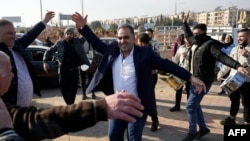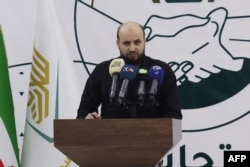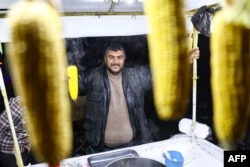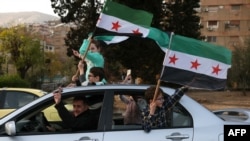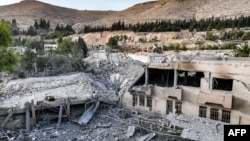Celebrations in Syria and the announcement of a new, transitional government continue to fuel optimism but have not slowed down international efforts to ensure that lingering tensions and hostilities do not sidetrack a better future for the country.
U.S. officials Tuesday pushed forward with their efforts, partly focused on making sure that terror groups such as Islamic State are not able to use the transition period as a chance to gain ground.
The commander of U.S. forces across the Middle East flew to Syria, meeting with members of the Syrian Democratic Forces (SDF), the Kurdish-led, U.S.-backed force that has been crucial in the fight against remnants of the terror group known as IS or ISIS.
U.S. Central Command said General Michael "Erik" Kurilla visited several bases in the eastern part of the country, getting a "firsthand assessment of force protection measures, the rapidly evolving situation, and ongoing efforts to prevent ISIS from exploiting the current situation," according to a CENTCOM statement.
Kurilla then traveled to Iraq, meeting with Iraqi Prime Minister Mohammed Shia' al-Sudani as well as with Iraqi military commanders.
"We remain dedicated to the enduring defeat of ISIS and committed to the security of our partners that neighbor Syria — including Iraq, Jordan, Lebanon, and Israel," Kurilla said.
U.S. Secretary of State Antony Blinken also spent part of Tuesday on the phone with allies regarding developments in Syria.
The State Department said Blinken spoke with counterparts in Jordan, the United Arab Emirates, Qatar and Egypt.
The U.S. outreach came as the Syrian rebels who overthrew longtime iron-fisted ruler Bashar al-Assad appointed on Tuesday a transitional head of government to run the country until March 1.
After a meeting in Damascus of rebel leaders and ousted officials from Assad's government, Mohammed al-Bashir, a figure little known across most of Syria who previously ran an administration in a small pocket of the northwest controlled by rebels, said he was picked to lead the interim government.
"The meeting was under the headline of transferring the files and institutions to caretake the government," Bashir said.
He stood in front of two flags: the green, black and white flag flown by opponents of Assad throughout the civil war, and a white flag with the Islamic oath of faith in black writing, typically flown in Syria by Sunni Islamist fighters.
But U.S. officials, who have also been in contact with the rebels, including the main rebel group Hayat Tahrir al-Sham (HTS), said they remain wary.
"Hayat Tahrir al-Sham is using the right words, but we will of course judge them not by those words but by their actions over the coming days, coming weeks, the coming months," said State Department spokesperson Matthew Miller.
Hayat Tahrir al-Sham is rooted in Syria's al-Qaida branch and is designated by many Western governments as a terrorist organization, though it has sought to moderate its rhetoric.
"We have not recognized the HTS as the governing authority in Syria," Miller told reporters. "We have not recognized them as the government of Syria."
The U.S. is not alone in its words of caution to the Syrian rebels.
Geir Pedersen, the United Nations envoy for Syria, said in Geneva that the groups that forced Assad to flee must transform their "good messages" into actions on the ground.
"They have been sending messages of unity, of inclusiveness," Pedersen said, adding that in Aleppo and Hama, "we have also seen ... reassuring things on the ground."
But "what we need not to see is of course that the good statements and what we are seeing on the ground at the beginning, that this is not followed up in practice in the days and the weeks ahead of us."
Yet there were signs Tuesday that many in Syria are looking for retribution or justice, or both, following decades of hard rule under the Assad regime.
Abu Mohammed al-Golani, the HTS leader who headed the offensive that forced Assad out, vowed to pursue former senior government officials responsible for torture and war crimes.
"Rewards will be offered to those who will provide information about senior army and security officers involved in war crimes," Golani said in a statement.
In the Syrian capital of Damascus, though, there was some sense of normalcy with a notable decrease in the number of armed people on the streets. Sources close to the rebels said commanders had ordered fighters to withdraw from cities and for police and internal security forces affiliated with HTS to deploy instead.
Banks and shops reopened for the first time since Assad's overthrow on Sunday and his flight to asylum in Russia. Traffic returned to the roads, construction workers were back fixing a roundabout in the Damascus city center and street cleaners swept roadways.
But some experts said the calm could be misleading.
"One of the things that we have to be mindful of is that the transitional government still doesn't control all of the country," said Brian Carter, the Middle East portfolio manager at American Enterprise Institute's Critical Threats Project.
"The reality is, on the ground, many different disparate groups actually control the terrain," he told VOA. "There's going to be a series of jockeying and negotiations for power over the next several months to see who comes out on top. And will that process be peaceful? I think there's a real risk."
Other signs of Middle East conflict remain.
Israel launched airstrikes against Syrian army bases, whose forces had melted away in the face of the lightning rebel advance that ousted Assad over a two-week period.
Israel sent forces across the border into a demilitarized zone inside Syria, saying its airstrikes were aimed at keeping weapons from falling into hostile hands. It denied reports that its forces had advanced beyond the buffer zone into the countryside southwest of Damascus.
U.N. envoy Pederson said Tuesday that the world body is continuing to see Israeli movements and bombardments into Syrian territory.
"This needs to stop," Pederson said.
Israeli troops were on the Syrian side of the buffer zone Tuesday, about 25 kilometers southwest of Damascus, according to several security sources cited by Reuters and the British-based Syrian Observatory for Human Rights.
Israel Defense Forces spokesperson Avichay Adraee said reports that Israeli forces were approaching Damascus were incorrect. He said Israeli troops were located inside the buffer zone and at defensive points close to the border.
Israeli Foreign Minister Gideon Saar said Monday that Israeli forces had struck suspected chemical weapons sites as well as long-range rockets as part of an effort to prevent them from ending up in the possession of hostile actors.
Saudi Arabia condemned Israel's actions in Syria, saying in a statement Tuesday that they violate international law and "sabotage Syria's chances of restoring its security, stability and territorial integrity."
Some material in this report came from Reuters and Agence France-Presse.




